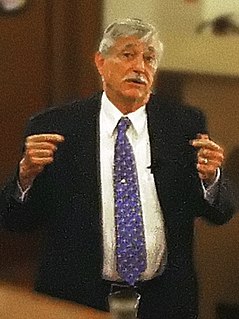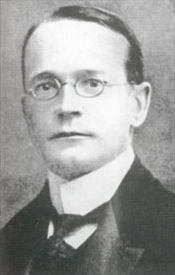Ein Zitat von Talcott Parsons
Ein theoretisches System stellt nicht nur Tatsachen dar, die beobachtet wurden, und stellt logisch ableitbare Beziehungen zu anderen Tatsachen her, die ebenfalls beobachtet wurden.
Themen zitieren
Verwandte Zitate
Alle guten Intellektuellen haben seit Bacons Zeiten wiederholt, dass es kein wirkliches Wissen geben kann, außer dem, das auf beobachteten Tatsachen basiert. Dies ist in unserem gegenwärtig fortgeschrittenen Stadium unbestreitbar; Aber wenn wir auf die Urstufe des menschlichen Wissens zurückblicken, werden wir sehen, dass es damals anders gewesen sein muss. Wenn es wahr ist, dass jede Theorie auf beobachteten Tatsachen basieren muss; Es ist ebenso wahr, dass Tatsachen nicht ohne die Führung einer Theorie beobachtet werden können. Ohne eine solche Führung wären unsere Fakten oberflächlich und fruchtlos; wir konnten sie nicht behalten, zumeist konnten wir sie nicht einmal wahrnehmen.
Der wahre vedantische Geist beginnt nicht mit einem System vorgefasster Ideen. Sie verfügt über absolute Freiheit und unübertroffenen Mut unter den Religionen hinsichtlich der zu beobachtenden Tatsachen und der vielfältigen Hypothesen, die sie zu deren Koordinierung aufgestellt hat. Da er nie durch einen Priesterorden eingeschränkt wurde, stand es jedem Menschen völlig frei, nach der spirituellen Erklärung des Schauspiels des Universums zu suchen, wo immer er wollte.
Die von uns akzeptierten Hypothesen sollten die von uns beobachteten Phänomene erklären. Aber sie sollten mehr als das tun; unsere Hypothesen sollten Phänomene vorhersagen, die noch nicht beobachtet wurden; ... denn wenn die Regel vorherrscht, umfasst sie alle Fälle; und wird sie alle bestimmen, wenn wir nur ihre tatsächlichen Konsequenzen abschätzen können. Daher wird es die Ergebnisse neuer Kombinationen vorhersagen und die Erscheinungen erklären, die bei alten aufgetreten sind. Und dass dies mit Gewissheit und Richtigkeit geschieht, ist eine Möglichkeit, die Hypothese als richtig und nützlich zu überprüfen.
Bloß verbale Schlussfolgerungen können keine Früchte tragen, sondern nur solche, die auf erwiesenen Tatsachen beruhen. Denn Bestätigung und Reden sind trügerisch und trügerisch. Deshalb muss man auch in Verallgemeinerungen an den Tatsachen festhalten und sich beharrlich mit den Tatsachen beschäftigen, wenn man sich jene leichtfertige und unfehlbare Gewohnheit aneignen will, die wir „die Kunst der Medizin“ nennen.
[Der Wissenschaftler] glaubt leidenschaftlich an Fakten, an gemessene Fakten. Er glaubt, dass es keine schlechten Tatsachen gibt, dass alle Tatsachen gute Tatsachen sind, auch wenn es sich um Tatsachen über schlechte Dinge handelt, und dass seine intellektuelle Befriedigung nur aus dem Erwerb genau bekannter Tatsachen, aus deren Organisation in einem Wissensbestand, in dem er entstehen kann der Zusammenhang der gemessenen Tatsachen ist die vorherrschende Überlegung.
Es scheint, dass moralische Phänomene, wenn sie in großem Maßstab beobachtet werden, physischen Phänomenen ähneln; und so gelangen wir bei Untersuchungen dieser Art zu dem Grundprinzip, dass je größer die Zahl der beobachteten Individuen ist, desto mehr verschwinden individuelle Besonderheiten, ob physisch oder moralisch, und lassen die allgemeinen Tatsachen in den Vordergrund treten , aufgrund dessen die Gesellschaft existiert und erhalten bleibt.
Es kann sicherlich keine Beleidigung sein, zu behaupten, dass der Fortschritt der Wissenschaft zu neuen Ansichten geführt hat und dass die Konsequenzen, die sich aus der Kenntnis von hundert Tatsachen ableiten lassen, sich stark von denen unterscheiden können, die sich aus fünf ableiten lassen. Es ist auch möglich, dass die zuerst bekannten Tatsachen Ausnahmen von einer Regel und nicht die Regel selbst darstellen, und Verallgemeinerungen aus diesen zuerst bekannten Tatsachen können, obwohl sie zu diesem Zeitpunkt nützlich sind, äußerst schädlich sein und den Fortschritt der Wissenschaft behindern beibehalten, wenn es einen Fortschritt gemacht hat.
Der Agnostiker, der Skeptiker ist neurotisch, aber das bedeutet keine falsche Philosophie; es impliziert die Entdeckung von Tatsachen, an die er sich nicht anzupassen weiß. Der Intellektuelle, der versucht, der Neurose zu entkommen, indem er den Tatsachen entkommt, handelt lediglich nach dem Grundsatz: „Wo Unwissenheit Glück bedeutet, ist es töricht, weise zu sein.“




































